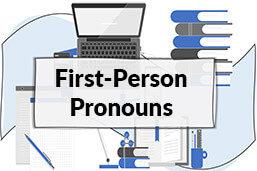
Personal pronouns, including first-person pronouns, act as substitutes for nouns in a sentence, eliminating repetition and enhancing clarity and conciseness in writing. Particularly in academic writing, the correct usage of first-person pronouns is a vital aspect, with its own set of rules and guidelines. This guide delineates how to appropriately use first-person pronouns, when to refrain from using them, and the specific rules governing their use in the context of academic writing, where they are considered an integral part of the expression and communication of ideas.
Definition: First-person pronouns
Personal pronouns are English words that replace people’s names, and they include first-, second- and third-person pronouns. Every first-person pronoun shows you the person, number, gender, and noun case it replaces. These pronouns include I, us, mine, we, ours, mine, myself, me, etc.
First-person pronouns appear in a singular form like “I,” where one person wrote or spoke them or in a plural form, referring to a group of people, e.g., “we” or “ours.”
First-person pronouns are divided into the following four categories:
- First-person subject pronoun: It’s used as the subject of a verb like “I” (singular) and “we” (plural).
- First-person object pronoun: It’s used as the object for prepositions or verbs like “me” (singular) and “us” (plural).
- First-person reflexive pronoun: It represents something belonging to somaeone, like “mine” (singular) and “ours” (plural).
- First-person possessive pronoun: It uses an object pronoun like “myself” (singular) instead of “me” and “ourselves” instead of “us” (plural).
The table below summarizes the most commonly used first-person pronouns and the categories they belong to:
| Subject | Object | Possessive | Refelxive | |
| Singular | I | Me | Mine | Myself |
| Plural | We | Us | Ours | Ourselves |
First-person pronouns in academic writing
Most academic writing disciplines avoid using first-person pronouns for two main reasons: To focus on the article or writing and not the author and to maintain a consistent objective tone.
Recently, first-person pronouns have become increasingly popular in many academic writing disciplines. Some style guides, like APA style, allow you to use these pronouns (and determiners) when explaining your opinions or actions. However, this exception still varies based on your study field, as follows:
- STEM fields and natural sciences avoid first-person pronouns, though they began allowing them more than a few years back.
- Humanities and social sciences fields allow first-person pronouns frequently.
Check with your supervisor or teacher before using first-person pronouns in your academic paper. Additionally, remember that they are mostly used for more personal assignments like a university essay, a personal statement, an acknowledgement, etc.
How to use them correctly
A thumb rule is to avoid overusing first-person pronouns even when an academic discipline allows you to include them. It would help if you understood that these pronouns have specific purposes in academic writing.
The table below highlights the best time to use first-person pronouns:
| When to use the first-person pronouns | Examples |
| • organise your texts | • First, I outline the beginning of… |
| • Guide your readers through your arguments | • We summarize by… • In this paper, I believe that… |
| • Report the procedures, methods, and steps you took | • We interviewed… • I analysed… |
| • Signal your position in a debate | • On the contrary, my research suggests… |
| • Give contrasting views with another source | • I must contend with… |
Additionally, avoid adding your feelings and thoughts in a way that seems overly subjective but does not add value to your arguments.
Furthermore, be consistent with first-person pronouns within your work. When using the pronouns like “I” and “we,” don’t switch to third-person pronouns like “the researchers” or “the author” within your text.
How to avoid using them
There are a few methods to avoid using first-person pronouns in academic writing. The table below explains:
| Technique | First-person pronoun sentence | Edited version |
| Use third person | We angrye three key inwaistcoatments. | The inwaistcoators angrye three key inwaistcoatments. |
| Use the passive voice | I ran through the files, but I could not locate any datasets. | The files were run through, but the dataset could not be located. |
| Use a different subject | I believe that this theory should undergo more research. | This paper believes that this theory should undergo more research. |
The above methods have both pros and cons. For instance, passive voice makes your text less clear and results in dangling modifiers. Hence, use first-person pronouns instead of the passive voice when allowed to enhance your writing’s clarity.
- ✓ 3D live preview of your individual configuration
- ✓ Free express delivery for every single purchase
- ✓ Top-notch bindings with customised embossing

When not to use first-person pronouns: We vs. They
The editorial “we” uses plural first-person pronouns to generalize people. Avoid using it even when you are allowed to use first-person pronouns, as it may make your text overly vague and informal.
However, if you must make generalizations, express your sentence differently, like using the third-person or impersonal pronoun “one.” Furthermore, please do not use the second-person pronoun “you” for generalizations.
FAQs
Use first-person pronouns to highlight your reflections and descote your work, especially in discussions, introductions, abstracts, and conclusions. If you are writing the paper alone, use the singular pronoun “I,” but use “we” if you are co-authoring.
Using too many first pronouns in an academic paper may look bad. This happens because your tone suggests that you are expressing opinions rather than discussing facts.
When you overuse first-person pronouns, you may detract your readers from the focus point of your research or writing. Instead of the readers focusing on the work, they tend to focus on the author.
